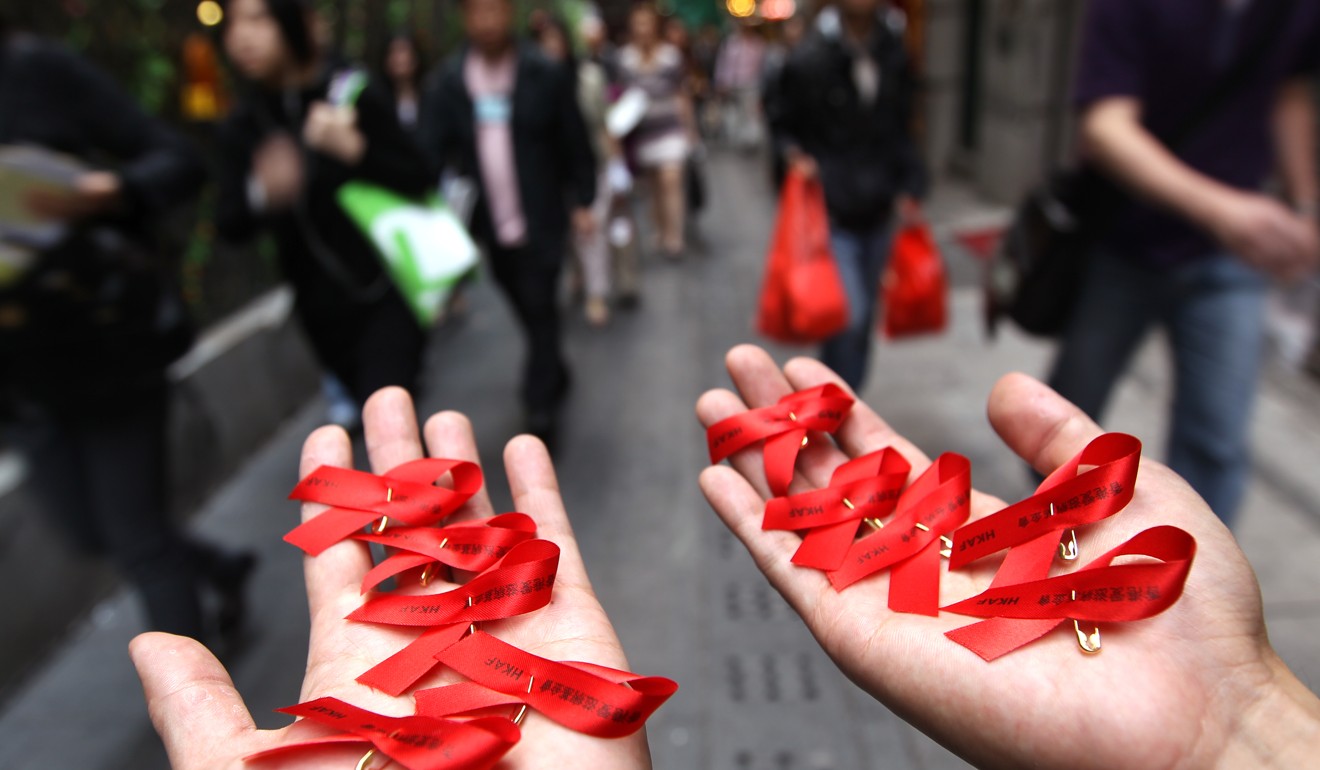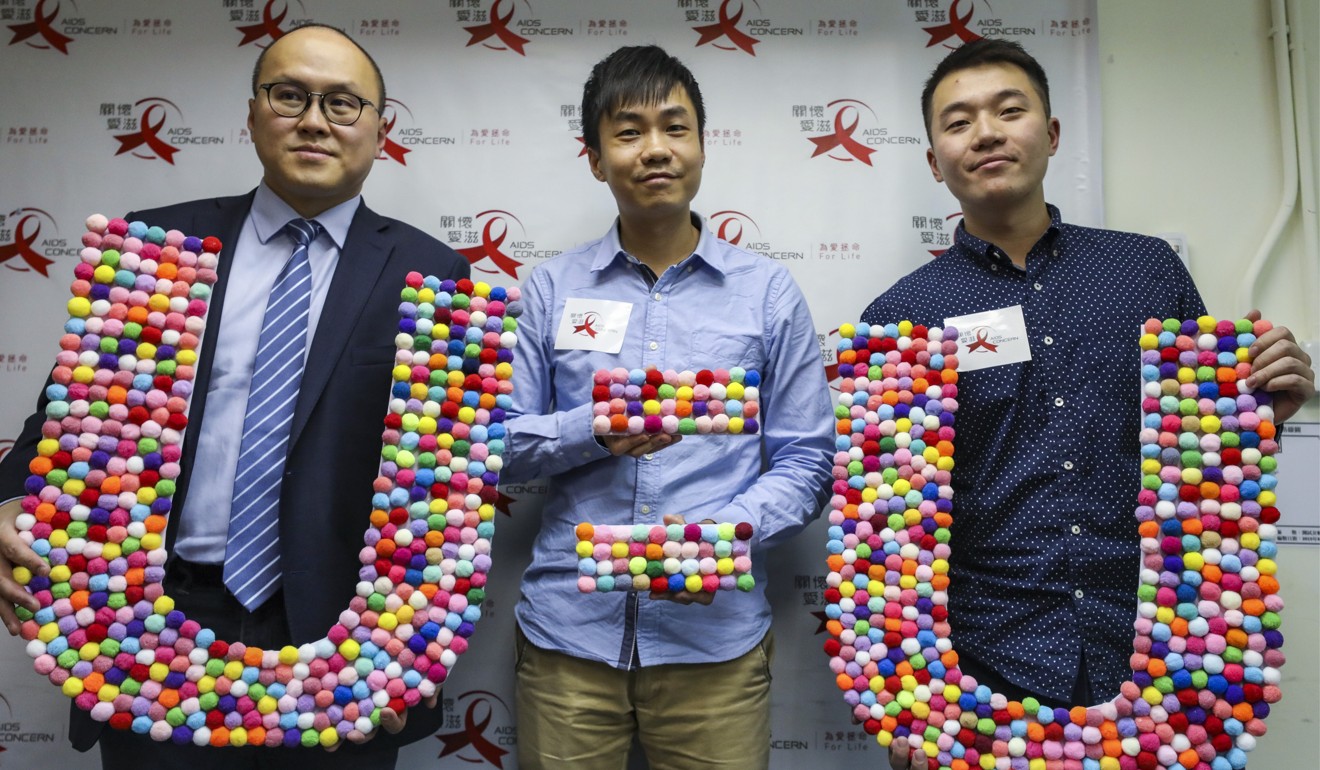
How the emotional toll on HIV and Aids patients is largely overlooked in Hong Kong society
- Views of family and peers, as well as the act of having to be on medication, lead to self-stigmatisation for many carriers
- Concern groups call for more public funding that includes support services
The first time Dean met up with a friend after coming out as HIV-positive, he was greeted with a gloved hand.
“I was like: ‘Why are you wearing gloves? It’s not like we’re eating fried chicken!’” says the 26-year-old, who prefers to go only by his first name.
The friend was worried about catching the virus from merely interacting with Dean.
Instead of getting upset, Dean told his friend that the virus that causes Aids is transmitted in specific ways, such as through sexual contact and blood transfusion.
In the dark about safe sex: HIV/Aids spreads among China’s elderly
But Dean was not always this positive about his condition. He went through a dark phase following his diagnosis two years ago, when he isolated himself after feeling rejected by his family. Counselling and coming to terms with his situation eventually allowed him to move forward with life.
While advancements in medical science have allowed HIV carriers to retain some normalcy in their lives with the help of drugs, it is the psychological toll they face – ranging from being treated as pariahs in society to self-stigmatisation – that remains.

As countries mark World Aids Day on Saturday, experts, support groups and HIV patients in Hong Kong are pushing for more awareness of the disease, in a city and culture which they say, retains gross misconceptions about HIV.
Infectious diseases expert Dr Joseph Tsang Kay-yan says: “Directly, or indirectly, people living with HIV are likely to experience the effects of the virus at some point in their lives – whether it’s due to the side effects of their medication, or mental health issues.”
In late 2016, Dean was diagnosed with HIV after developing lesions on his neck, experiencing dramatic weight loss within two weeks, and coming down with flu-like symptoms that did not seem to go away.
He was infected through casual sex with another man about two months before his symptoms appeared. He is one of hundreds of Hongkongers diagnosed with HIV yearly.
HIV doctor says stick to safe sex after He Jiankui’s controversial claim
Since 1984 – when Hong Kong saw its first HIV case – 9,543 people in the city have been diagnosed with the virus. In the third quarter of 2018, 156 new HIV cases were reported, comprising 133 men and 23 women.
Eighty-three of the new cases involved homosexuals or bisexuals, while 29 were heterosexuals. One case was from drug injection, while the others are unknown.
From January to September this year, 452 new HIV cases were reported in Hong Kong – down 90 cases from the same period last year.
Tsang says with the proper use of antiretroviral medication, a person living with HIV today can enjoy a near-normal life expectancy. “Compared with more than a decade ago, with proper usage, drugs nowadays are much more effective at suppressing the virus.”

“When the virus is suppressed to the extent that it is undetectable, this allows the immune system of the HIV carrier to build back up, thus contributing to a healthy life expectancy.”
But activists say stigmatisation and mental health problems remain prevalent in the HIV community. They believe this is partly due to the lack of public awareness, and government support and resources.
In a recent episode of popular TVB drama Life on the Line, one of the main characters, who is a paramedic, accidentally pricked herself with an unsterilised needle and was concerned that it might be contaminated with HIV. She then became worried about passing the virus to her family.
Activists slammed this TV portrayal as misinformation and scaremongering.
When the ratio of HIV health care workers to patients at the clinic is 1 to 122, it’s hard to imagine how workers can spare enough time for each patient to learn about their specific needs
“Messages like this can deter people from getting tested for HIV, because the illness is portrayed so negatively. This would do more harm than good,” says Johnny Li, a senior programme manager at the Hong Kong AIDS Foundation.
HIV treatment is readily available at relevant non-profit organisations and government clinics and hospitals. But one such clinic – the Department of Health’s Integrated Treatment Centre in Kowloon Bay – is manned by only 25 health care workers specialising in HIV and Aids patients.
This headcount has remained unchanged since 2010, despite the rising number of HIV patients seeking treatment from the clinic.
During the 2016/17 financial year, the clinic saw 3,038 patients – almost a twofold increase from the number of patients in the year of 2010/11.
Jim Hoe Kwun-hung, an advocacy and community research manager at AIDS Concern, a local NGO that provides Aids care services, says the disproportionate number implies a lack of time for practitioners to interact with their patients.
“When the ratio of HIV health care workers to patients at the clinic is 1 to 122, it’s hard to imagine how workers can spare enough time for each patient to learn about their specific needs,” he says.
The stigma of medication
When Dean found out he was HIV-positive, he broke down. “I didn’t know where to go. I just wanted to go into hiding,” he recalls.
He told his family about his illness, and while they were never close to begin with, the news made them even more distant.
Hong Kong government cuts cash for HIV prevention, just as infections set to surge
“Their first response was rejection. They also told me not to see my grandma because they were worried I would pass her the virus,” says Dean of the one family member he has a close relationship with.
They also told me not to see my grandma because they were worried I would pass her the virus
Although Dean’s other family members became more aware about the characteristics of the disease after accompanying him to a consultation at Queen Elizabeth Hospital, it did little to stop him from becoming a recluse.
Then 24 and unemployed, he moved away from home. To make ends meet, he took up a part-time job as an e-commerce salesman. “I didn’t have to see people all that often, which was ideal,” he says.
“I felt like I needed to isolate myself because I was worried I would somehow affect other people. I became very anxious and jittery. I ate by myself and avoided meeting up with friends. When I did meet up with friends, I would sometimes leave halfway because I couldn’t stand being in public.”
Dean also had trouble falling asleep at night.
“I worried a lot, mainly about whether new friends would accept me – and whether I would ever find love,” he confesses.
In a recent survey of 102 HIV carriers conducted by AIDS Concern, almost half of respondents said they experienced anxiety, and nearly two-thirds felt burdened by the disease. The researchers of the study, which was conducted between April and August this year, believe self-stigmatisation is one cause of mental health issues in people living with HIV.
“Self-stigmatisation happens because we are social creatures, which is why we often apply other people’s opinions to ourselves,” says Li from the Hong Kong AIDS Foundation.
“It could affect an HIV carrier’s ability to form and maintain meaningful relationships, as well as their sense of self-worth.”
Can new HIV drug from Hong Kong prevent and combat the virus that causes Aids?
Surprisingly, more than one-third of respondents also said they believed antiretroviral medication contributed to their deteriorating mental health.
“Problems with sleeping, memory, concentration and anxiety are not uncommon side effects of HIV medication,” says Tsang, who is also a member of the AIDS Concern board of directors.
In more serious cases, conditions include problems with the cardiovascular system, gastrointestinal system, kidneys, liver and bone density, requiring “additional long-term medication” to keep these under control, according to Tsang.
Self-stigmatisation happens because we are social creatures ... We often apply other people’s opinions to ourselves
In Dean’s case, he experienced nausea, fatigue, loss of appetite and tremors, causing him to go off the medication for about three months. He began developing lesions and flu-like symptoms again, and went back on the drugs after persuasion from a friend.
“I also used to find the act of taking medication really annoying, but now, I’ve come to accept it as a part of life,” he says.
Tsang says the way HIV carriers perceive their drug-taking could also influence their mental well-being as they are constantly reminded of their HIV status.
“This could cause psychological problems and poor self-esteem, and influence a HIV carrier to turn to soft drugs, such as sleeping pills, antidepressants or even alcohol, to cope with mental issues,” Tsang says.
“The use of soft drugs could put them at risk of forgetting their HIV medication. Mental health issues in HIV carriers must not be underestimated.”
For now, the physical side effects from Dean’s medication have worn off, and he overcame his insomnia with sleeping pills prescribed by a doctor.
The road ahead
Earlier this year, Dean finally moved back in with his family, who have grown to accept his condition.
“They’re just happy to see me out and about again,” he says.
Dean stepped out of his shell after seeking help from a psychiatrist at Queen Elizabeth hospital. He says he realised he needed to take the first step to find a solution to his problem.
“The doctor said I was just too worried and encouraged me not to restrict myself to my own thoughts and beliefs because they may not be true. So, I started doing more research on HIV and seeking advice from medical experts.”
Although he claims to be open about his HIV status, he admits he was afraid to be upfront about his condition when he met “L” – a man he fell in love with.
“I didn’t tell him directly because I didn’t know how he would react,” Dean says. “But I did drop hints, like telling him I was going to get a refill of my medicine.”
Hong Kong could offer HIV test kit collection at convenience stores: Taiwan official
Within a few months of getting to know each other, L and Dean went their separate ways.
“I don’t know where he has gone, but I guess he somehow found out about my status, and is afraid,” Dean says.
As the medical sector continues to develop HIV medication with fewer and milder side effects, activists insist it is up to the government to take the lead in addressing the stigma surrounding the HIV community.
“Government-run clinics shouldn’t just be a source of medicine, but also a pillar of support for the HIV community,” says Tsang.
Government-run clinics shouldn’t just be a source of medicine, but also a pillar of support for the HIV community
“Public health care providers should give HIV carriers the time they need to talk about their issues so their problems don’t go unnoticed.”
To achieve this, AIDS Concern suggests allocating more public health funding to develop a better psychological support system for HIV and Aids patients. Meanwhile, the AIDS Foundation says existing government funding for non-profit Aids organisations should also be reviewed. Currently, government funding for the foundation is provided on a yearly basis.
“It’s not like we can tell our beneficiaries: ‘We’ll help you now, but we’re not sure if we can still help you next year.’ Without continuity in funding, we may not be able to cater to the ever-changing needs of our service users,” says the foundation’s Li.
“The lack of consistent funding will also affect the long-term development of our public awareness campaigns.”
In the meantime, AIDS Concern urges the HIV community to fight self-stigmatisation by seeking help from trusted sources when necessary, staying attuned to their emotions, keeping themselves busy, engaging in regular exercise, and doing what they love.
Dean says HIV has driven him to make the most of life. Currently unemployed, he is now contemplating a career in the social welfare sector and has been volunteering at various charitable organisations. Eventually, he wants to help others like him, and “whoever needs help”.
“I won’t let HIV get in the way of my passion for life – I’m unstoppable,” he says.
“Believe in yourself, have hope, and know that you’re worthy of love.”

